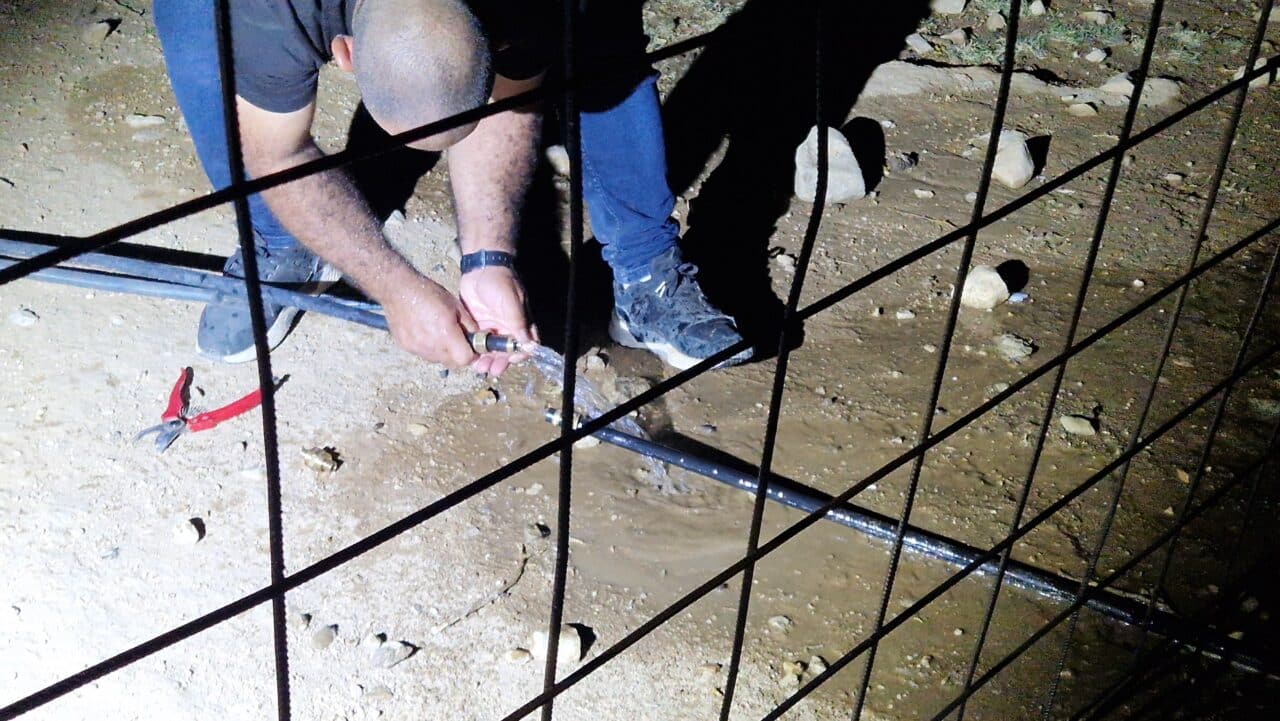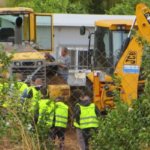Existence is Resistance – Jordan Valley Solidarity
inminds– 3 March 2012
“We can hear water running under our feet..
but we are not allowed to drink from it
– it goes to the settlements..
Every drop of water in the Jordan Valley
is under the full control of the Israeli authority..
If there is no water, there is no life..”
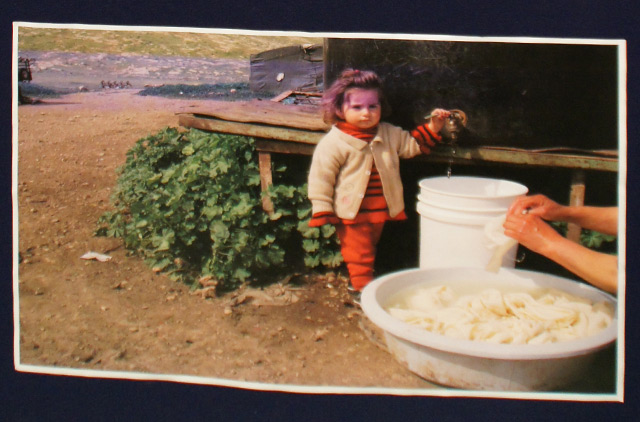
Every drop of water in the Jordan Valley is under the full control of the Israeli authority.
Jordan Valley Solidarity is a network of Palestinian grassroots community groups from all over the Jordan Valley and international supporters. Their aim is simple – to protect Palestinian existence in the Jordan Valley. They do this by supporting communities on the ground by helping them build houses and schools in an area the Israeli occupation has denied Palestinians the right to build. They also monitor, record and try to prevent abuse of Palestinian human rights by the Israeli occupation and settlers.
Two activists from Jordan Valley Solidarity, Fathy Khdirat and Itaf Njoum Karma, are currently touring Europe raising awareness of the issues. Fathy Khdirat is the Palestinian co-ordinator and founding member of Jordan Valley Solidarity whilst Itaf Njoum Karma is the co-ordinator for the Bedouin community of Ras Al Auja, who have faced persistent theft of their water resources by Israel, alongside house demolitions and destruction of the community built school where she also volunteers as a teacher. They spoke in Brighton, at the Friends Meeting House, on 23rd February 2012. The event was jointly organised by Brighton Jordan Valley Solidarity and Brighton Palestine Solidarity Campaign.
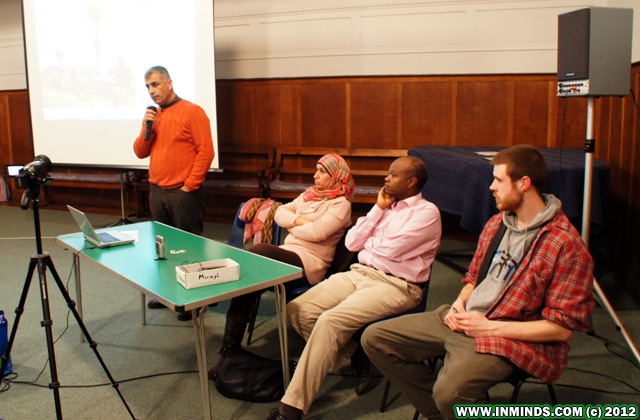
Fathy Khdirat explained that Jordan Valley Solidarity is the only group working in what is classified as Area C, that is under total control of the Israeli occupation authority. Land on which Israel has built its illegal colonial settlements which are expanding unchecked whilst the remaining Palestinian communities are systematically being ethnically cleansed from their homes by use of demolitions, by the denial of education and health by the refusal to allow the building of schools and health centres, and by the denial of drinking water to Palestinian communities in an area rich in natural water resources:
“As Jordan Valley Solidarity we just works in area C where the occupation does not allow Palestinians to receive any services. the Jordan valley is about 30% of the occupied territory of the West Bank, and 95% of this land is closed in front of the Palestinians. We are the only group who decide to fight, to build, to resist, to help people to exist in their homeland because we realise that the occupation have a plan to expel everybody from that area.
The occupation authority managed to reduce, or transfer the majority of the Palestinian population from the Jordan valley. they managed to reduce the population from about 320,000 before the 1967 occupation living in 52 communities to about 60,000 Palestinian people now after 43 years of occupation..
By direct transfer and indirect transfer Israel forced the Palestinian to move to the other side of the river, to Jordan. For example my family, the close relatives – my brothers and cousins, now we are about 200 something. I’m just living in Palestine with my family, we are just 5 people. They transferred them to Jordan. They forced them, in the beginning, direct after the occupation, they used to collect people my military lorries and transfer them to the other side of the river, to the Jordanian side. Then they started to shoot everybody that was moving, especially at night.
Then they started to use other methods, this is the second phase of forcing people to leave. And this systematic transfer is still going on, like preventing people from reaching water resources. If there is no water, there is no life. So preventing people from using water resources, that means pushing them to leave, forcing them to leave. And until now the majority of the Palestinian communities in the Jordan valley, they don’t have water resources, and the water is the most expensive thing that people need to buy, in spite of the fact that the Jordan valley is one of the richest places for water resources. But water is only available for one kind of people – the Jews. The Palestinian people can hear water running under their feet, going to the settlement, but they are not allowed to drink from it.
Just seven communities in the Jordan valley are allowed to buy limited amounts of water from the Israeli company. Every drop of water in the Jordan valley is under the full control of the Israeli authority. A lot of people get fined huge fines because they steal some water to drink. Last year the Israelis confiscated about 5 tractors and about 7 water tanks brought by tractor claiming that they are entering a closed area.
So this is one of the faces of the apartheid regime, and this is one of the ways that they transfer and ethnically cleans the Palestinian population in the Jordan valley.”
Ein El-Hilweh Solidarity School
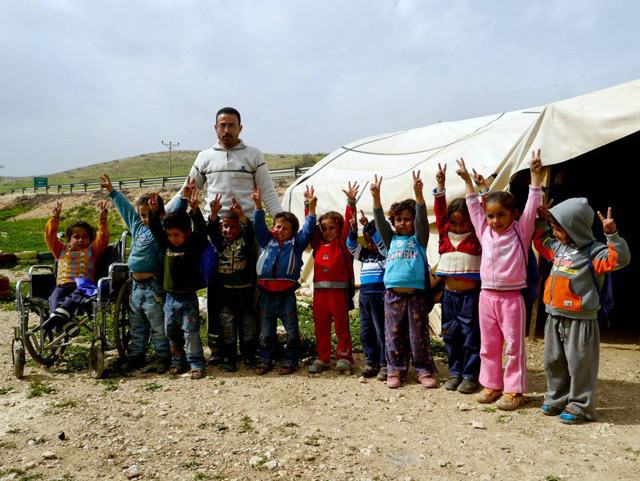
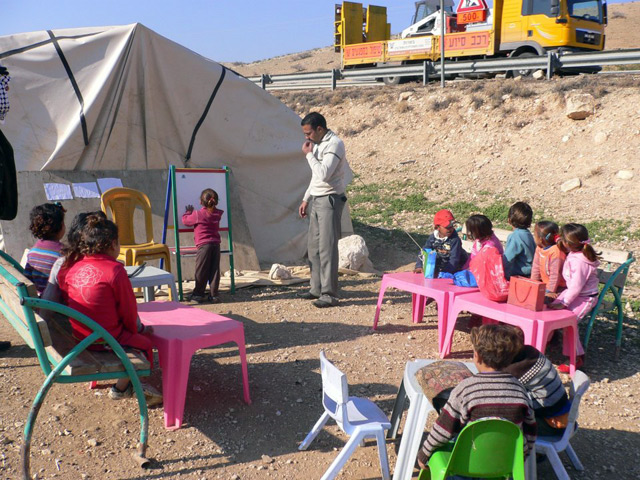
Volunteer teacher Ibrahim teaches classes in Arabic, maths, religion, art and hygiene. When the weather is good, classes are held outside the tent under the sun. Every day, Ibrahim collects the children from their homes, walks them to school and back afterwards. In time they hope to replace the tent with a permanent structure, made of mud bricks. To date Jordan Valley Solidarity has built 6 schools from kindergartens to large secondary schools. Each time directly challenging racist Israeli laws which prohibit Palestinian communities from building schools.
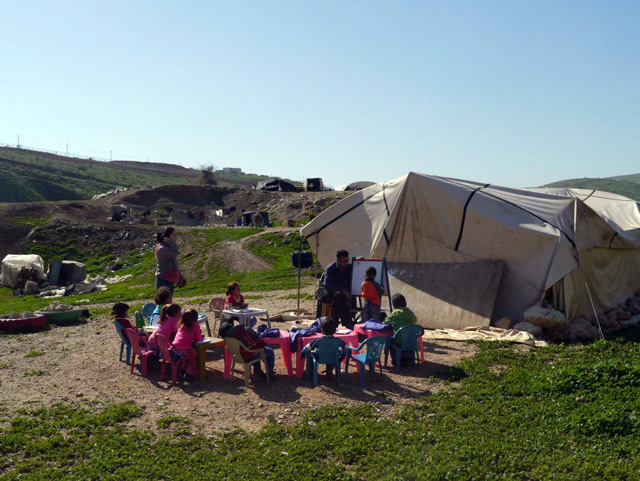
Ein El-Hilweh tent school is really important to the local community, which has suffered sustained acts of violence from the military and fundamental religious settlers living in the illegal Maskiyot settlement, established in 2002, which overlooks the village. For generations, Bedouin Palestinians living in Ein El Hilwe built their communities around a beautiful natural spring, that gave them access to fresh water nearly all year round – hence the name of the village: Ein El Hilwe, or ‘Sweet Spring’. They have now been prohibited from using the natural spring which flows right through the village, and are forced to drive 12km with a tractor and water tank to buy water from the Israeli state water company.
Photos courtesy www.jordanvalleysolidarity.org
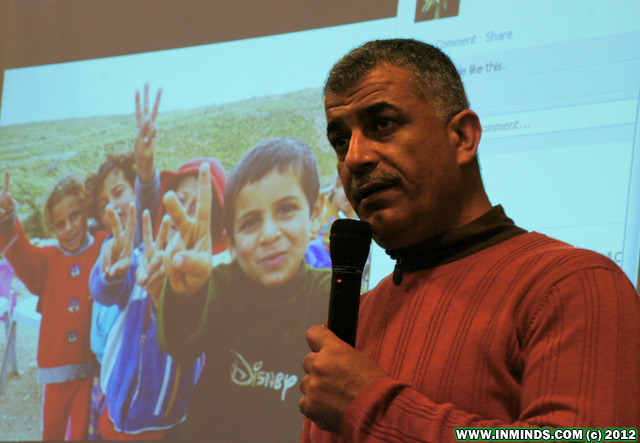 Fathy Khdirat was critical of many so-called humanitarian organisations who have gone along with the Israeli occupation, even collaborated with it, by following Israel’s instructions not to work in Area C, not to help Palestinian communities living in Area C:
Fathy Khdirat was critical of many so-called humanitarian organisations who have gone along with the Israeli occupation, even collaborated with it, by following Israel’s instructions not to work in Area C, not to help Palestinian communities living in Area C:“The question is why the others who call themselves humanitarian organisations, why they close theirs eyes and do not help the Palestinians in their main necessary needs, main humanitarian needs – right of education, right of health, right of house, right for water..to exist in their homeland?
As for the second step for the Jordan Valley Solidarity after struggling about 6 years building and creating facts and helping people exist in their homeland, we decided to stop dealing with all these organisations who refuse to work in area C. This is not a conflict area, its an occupied territory. And we are wondering why those national and international humanitarian organisations and donors refuse to work to help the Palestinians to exist in their homeland..
They did not help the Palestinians in area C at all, since the beginning, because they are respecting the illegal occupation’s regulations. And I think they are part of the system, part of those making pressure against the Palestinians. I think you need to ask them, You need to ask for example the International Red Cross why they have a special agreement with Israel, why they did not give immediate first aid to the Palestinians when the Israelis knocked down their houses, why did they wait for about 48hours before they gave this kind of very, very simple support to the families that faced the Israeli aggression, faced demolition by the Israeli bulldozers, while they received Israeli notice 24 hours before they knocked down the Palestinian houses. You have to ask for example Save the Children UK why they refuse to work in area C to build for children at least a kindergarten. You have to ask Oxfam GB why at least they did not publish reports about Israeli violations of Palestinian human rights in the occupied territory – we don’t need them to work in area C, we need them just to talk – its important. Its important to ask your organisations, I’m not talking about JICA the Japanese Agency, I’m talking about one of the most maybe famous and we can say “respectful” organisation in the UK or the world – Oxfam. Let us ask them why they did not work in 95% of the land in the Jordan Valley, why instead of building a 500 cubic metre water tank for the Palestinian people in al-Jifnik, they distributed 500 1 cubic meter plastic water bottles to the families to the people who did not have a water network. You have to ask them where is their reports, where is the word “occupation” in their reports, in their website? They didn’t even mention the occupation. When you see their reports about the suffering of the Palestinian people you will imagine that an earthquake shook that area, or people who live their are disabled people and that’s why they are suffering. They don’t want to talk about the occupation.”
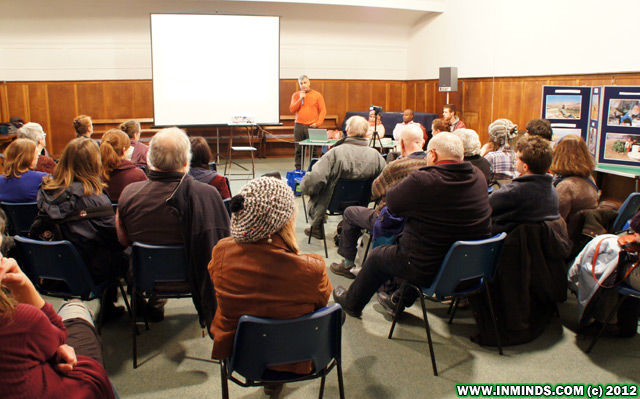
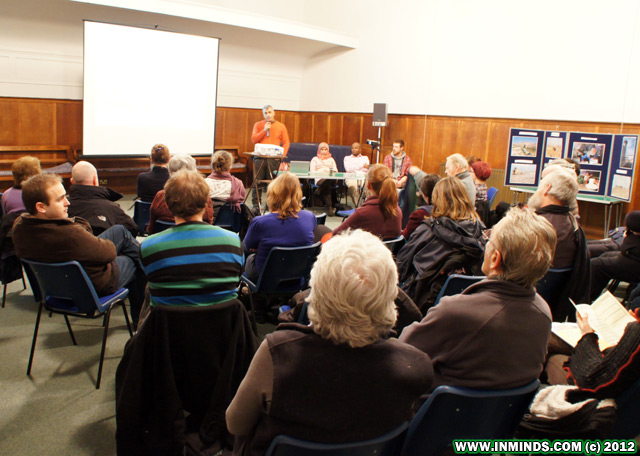
Fathy Khdirat went on to explain the history of successes that Jordan Valley Solidarity have achieved:
We began our campaign, sharing with the community in one of the biggest Palestinian villages called Al Jiftlik, building a tent school. Some of the Brightonians I think in early 2005 visited that school and after 4 years of struggling for the right of education of the Palestinian children in that village we managed to get the permission to build a school. we managed by big struggle, intervention by a lot of political representatives, a huge media coverage, for a tent school.
We never ask permission for education because I don’t believe the Israel occupation authority has the right to control me and my land, it an illegal occupation.
We started with Al Jiftlik, a tent school, after a tent we have like a very simple school before they give permission. We moved for Fasayil with the Brightonians side by side [built a school], and then we moved to Al Kaabna school, then we share building at al Ka’abneh which is a place between Jerusalem and Jerico, then we sent mud bricks to Bethlehem area which is about 100km from the Jordan Valley, then we have Ein El-Hilweh school, we have Mak-hul school we have Khowzaliya school. We are not an education organisation, and we are not the Ministry of Education, but this is the way – the non-violence way to resist against occupation.
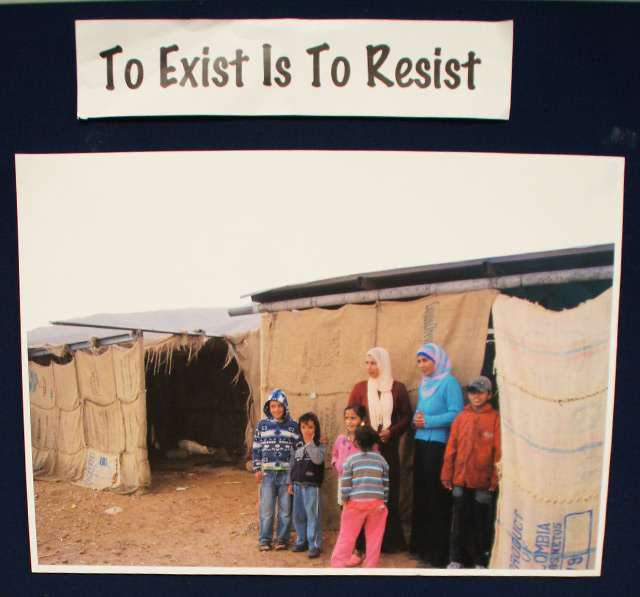
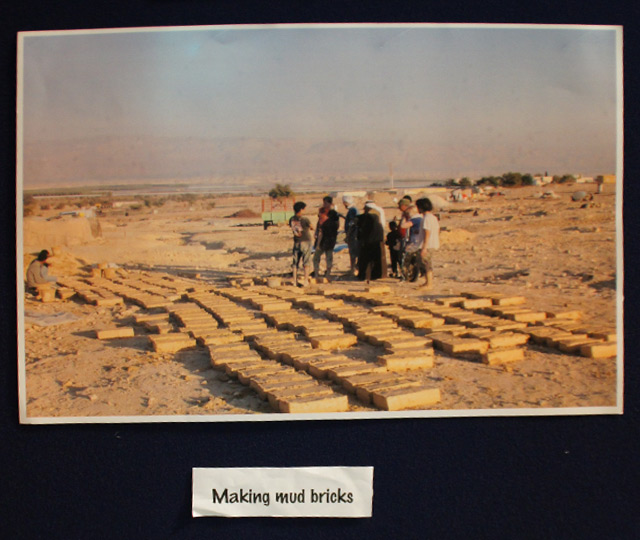
Fathy Khdirat explained that existing school have been destroyed by the Israeli occupation who have also prevented building of health clinics:
Fasayil school for example was knocked down by the occupation, and there was a school which used to be run by the United Nations and that doesn’t exist any more.. Until 1996 we didn’t have any health clinic in the Jordan Valley.
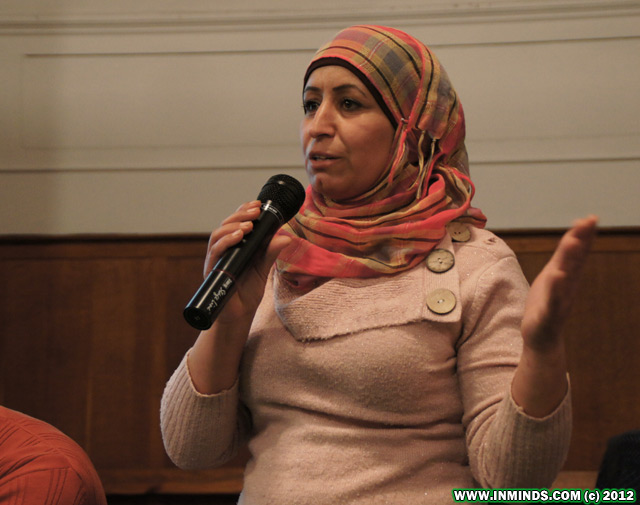
Its interesting that Palestinians living in Zone C, facing the worst conditions of the occupation where they are even denied drinking water, and are forced to work for the settlements, are fully backing the call to boycott Israel.
Whilst discussing the BDS victory over Agrexco and its subsequent collapse Fathy did caution activists to be vigilant that before it was easy to identify Israeli produce because much of it carried the Carmel Agrexco label but now we could see a multitude of companies with some even claiming to be Palestinian whist in reality settler owned. He suggested the safest way was to only accept fair-trade Palestinian produce as genuinely Palestinian. This is something we ourselves discovered during a research project we conducted last autumn, in partnership with London Rhymes With Palestine, of one of London’s largest fresh produce wholesale markets which supply most of Londons greengrocers. We discovered a pallet of Barhi dates prominently labelled as “Fresh Gate Co. Jericho – Palestine” in green with images of mosque minarets and domes. Yet closer inspection of the box revealed contact details of the Israeli company Mehadrin, which since Agrexco’s fall has become Israelis #1 exporter of fresh produce, much of it from the settlements in the Jordan Valley.
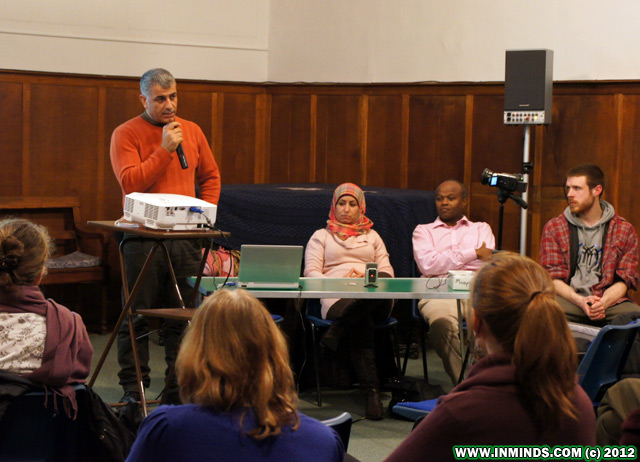
- 0:00:00 Introduction
- 0:01:00 Fathy Khdirat
- 0:11:40 Itaf Njoum Karma
- 0:22:24 Questions & Answers Fathy Khdirat
- 0:47:40 Questions & Answers Itaf Njoum Karma
- 0:53:09 Questions & Answers Fathy Khdirat
- 1:09:25 Questions & Answers Itaf Njoum Karma
- 1:11:40 Questions & Answers Fathy Khdirat
- 1:24:00 Questions & Answers Itaf Njoum Karma
- 1:25:25 Announcements

